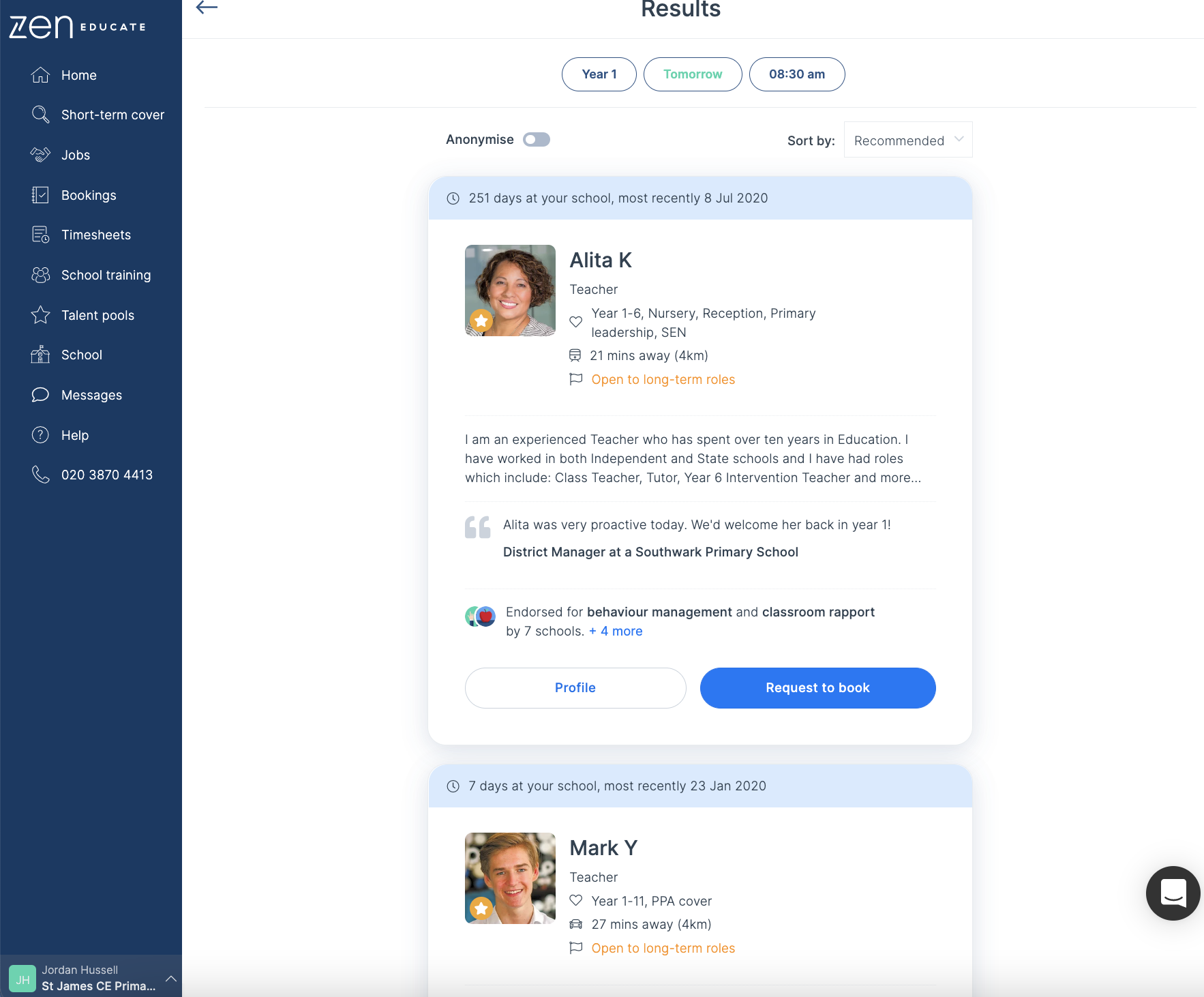Zen Educate, an online marketplace that algorithmically matches schools with the best available teachers, has raised £19.3 million ($21 million) in a Series A extension round of funding.
Founded out of London in 2017, Zen Educate is setting out to supplant the traditional approach to recruiting teachers, a system that typically involves third-party agencies and hefty fees. On top of that, working with agencies often entails analog workflows, with paper-based timesheets and phone calls the order of the day.
“Those agencies are incredibly expensive — the average U.K. education recruiter has a 30 to 35% margin,” Zen Educate co-founder and CEO Slava Kremerman explained to TechCrunch.
By cutting out these pricey intermediaries, Zen Educate promises to reduce many of the costs and administrative friction involved in hiring supply teachers, as well as full-time teachers and teaching assistants, through a self-serve platform that allows teachers and schools to manage their own profiles. But it’s not a complete free-for-all, as the company says it uses its own proprietary technology to conduct “extensive checks” on teachers during the sign-up process.

The main benefits Zen Educate touts is that it serves as a filter that algorithmically surfaces the most suitable teachers based on a range of criteria.
“Rather than just seeing a universe of teachers and then randomly ‘guessing’ which ones to offer a role to, schools can see a curated list created by a match algorithm that factors in availability, skillset, proximity, the type of role and previous feedback as well as numerous other factors,” Kremerman said.
Schools can also create “favorite” lists of the most suitable teachers, so they can pool the best-performing substitutes based on previous experience, and easily rebook them when the situation requires it.

Show me the money
Kremerman said that his company has crunched the U.K. government’s own reported school financing data, and established that schools spend around £2 billion ($2.2 billion) annually on temporary staff, of which £600 million ($662 million) can be attributed to agency fees. And it’s these fees that Zen Educate wants to reduce, but not quite eliminate.
Indeed, Kremerman says that his company charges a markup, around 15-18%, on each hour or day that’s booked through its platform. And it claims to have already saved the U.K. education sector £10 million ($11 million) on “wasted recruitment agency fees.”
“There’s a spread between what the teacher gets paid and what Zen Educate charges the school — the school saves money, and the teacher earns more,” he said.

So far, Zen Educate has largely served schools in the U.K. cities of London, Manchester, Birmingham, Bristol and Leeds, though it soft-launched in the U.S. back in March starting in Minneapolis, where Kremerman says it’s currently powering around 7,000 hours of teaching cover per month. And with another chunk of change in the bank, it’s now well-financed to expand further into the U.S. market, starting with Houston, Texas, later this month.
While there have been some technology-focused attempts to counter the existing agency-based order in the U.K., nothing of note has gained any meaningful traction. And in the U.S., there are major players such as human capital management platform Frontline Education, which is currently in the process of changing ownership between two private equity firms as part of a $3.7 billion transaction. Elsewhere, Swing Education is doing something a little similar to Zen Educate, though with a specific focus on substitute teachers only.
Whatever competition that does exist out there, with an estimated 1.2 million substitute teachers in the U.S. alone, there is more than enough room to accommodate more than one tech-infused marketplace that brings teacher and school matchmaking into the 21st century.
“The best metaphor is to imagine if you used Uber, and it just showed you a list of all the taxis in London — but didn’t tell you whether they still worked, whether they were available, where they were, or what type of car it is,” Kremerman said. “That’s how supply teaching happens now.”
Zen Educate had previously raised around £9.4 million ($10.4 million) in funding across several rounds, the most recent being a £6.8 million ($7.5 million ) Series A round spread between 2019 and 2020. Now, the company is adding a further £19.3 million to the pot, taking its total funding to £28.7 million, with backers including edtech-focused VC firm Brighteye Ventures, Adjuvo, Ascension Ventures, and a slew of angel investors.
In addition to market expansion, Kremerman said the fresh cash injection will be used to double its headcount to 200 in the next six months, as well as acquire some incumbents in the market.






























Comment